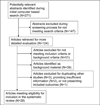Effectiveness of peer education interventions for HIV prevention in developing countries: a systematic review and meta-analysis
- PMID: 19519235
- PMCID: PMC3927325
- DOI: 10.1521/aeap.2009.21.3.181
Effectiveness of peer education interventions for HIV prevention in developing countries: a systematic review and meta-analysis
Abstract
Peer education for HIV prevention has been widely implemented in developing countries, yet the effectiveness of this intervention has not been systematically evaluated. We conducted a systematic review and meta-analysis of peer education interventions in developing countries published between January 1990 and November 2006. Standardized methods of searching and data abstraction were utilized. Merged effect sizes were calculated using random effects models. Thirty studies were identified. In meta-analysis, peer education interventions were significantly associated with increased HIV knowledge (odds ratio [OR]: 2.28; 95%, confidence interval [CI]:1.88, 2.75), reduced equipment sharing among injection drug users (OR: 0.37; 95% CI: 0.20, 0.67), and increased condom use (OR: 1.92; 95% CI: 1.59, 2.33). Peer education programs had a nonsignificant effect on sexually transmitted infections (OR: 1.22; 95% CI:0.88, 1.71). Meta-analysis indicates that peer education programs in developing countries are moderately effective at improving behavioral outcomes but show no significant impact on biological outcomes. Further research is needed to determine factors that maximize the likelihood of program success.
Figures
References
-
- Agha S, van Rossem R. Impact of a school-based peer sexual health intervention on normative beliefs, risk perceptions, and sexual behavior of Zambian adolescents. J Adolesc Health. 2004;34(5):441–452. - PubMed
-
- Agha S. An evaluation of the effectiveness of a peer sexual health intervention among secondary-school students in Zambia. AIDS Education and Prevention. 2002;14(4):269–281. - PubMed
-
- Asamoah A. Effects of adult-led didactic presentation and peer-led discussion on AIDS-knowledge of junior secondary school students. IFE Psychologia: An International Journal. 1999;7(2):213–228.
-
- Asamoah A, Weir S, Pappoe M, Kanlisi N, Neequaye Al, Lamptey P. Evaluation of a targeted AIDS prevention intervention to increase condom use among prostitutes in Ghana. AIDS. 1994;8(2):239–246. - PubMed
Publication types
MeSH terms
Grants and funding
LinkOut - more resources
Full Text Sources
Medical


